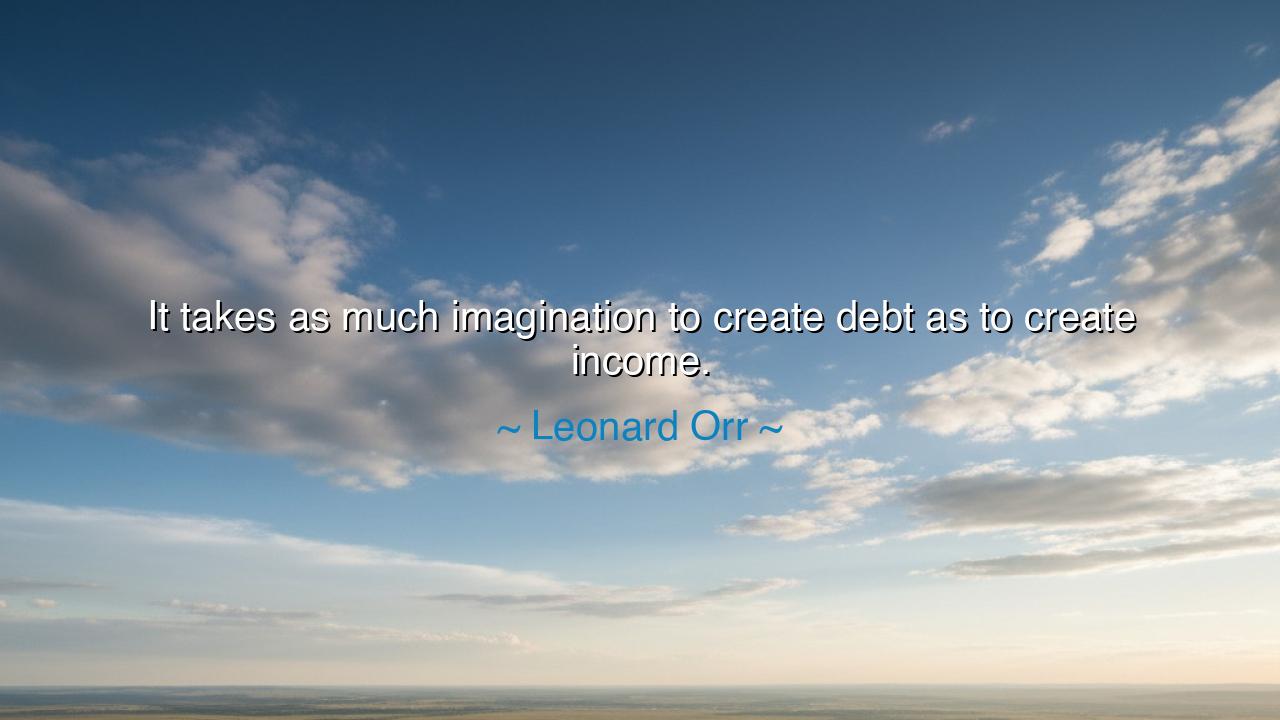
It takes as much imagination to create debt as to create income.






“It takes as much imagination to create debt as to create income,” declared Leonard Orr, a man who delved into both the mysteries of the spirit and the illusions of material life. In these few words, he unveils a truth both humbling and profound: that the mind is the architect of fortune and failure alike. Whether one rises into wealth or descends into debt, both begin in the same invisible forge — the imagination. For all things that manifest in the world first take root in thought. Thus, our prosperity and our poverty are born not in circumstance, but in the images we hold and the beliefs we serve.
In the manner of the ancients, Orr’s saying reminds us that the outer world is a mirror of the inner one. The same creative fire that builds empires can also breed ruin, depending on how it is directed. To create income, one must envision abundance — to imagine opportunity where others see none, to shape the unseen into the tangible. But to create debt, one must also imagine — to believe in lack, to magnify fear, to build castles of desire upon foundations of sand. Both are acts of creation. Both demand belief, passion, and faith in an unseen outcome. The difference lies only in the direction of imagination — toward light or shadow, toward growth or decay.
Consider the story of Thomas Edison, whose life was a testament to the creative imagination. In his early years, he was deep in debt, laughed at by investors, surrounded by failed experiments and the mockery of skeptics. Yet his vision refused to die. He saw light before there was light; he imagined a world transformed by invention. While others imagined scarcity, he imagined possibility. In that imagination lay his redemption. The same energy that once created his struggle was redirected toward creation — and from his imagination, the electric world was born. Had his vision remained chained to fear, his genius would have been his debt. Instead, it became his income, and the world’s inheritance.
Orr’s insight also speaks to a subtler truth: that debt is not only financial. There are debts of spirit, of time, of love. A man may owe more in broken promises than in gold. Every debt begins in the mind — in the false imagination that something essential is missing, that we must borrow from tomorrow to fill the emptiness of today. But the one who imagines wholeness, who believes that he already holds the seeds of sufficiency, creates abundance. Thus, imagination is the balance sheet of the soul — its figures written not in numbers, but in thoughts.
In every age, humanity has been both creator and debtor. Nations have imagined themselves into wars and into golden ages. The Roman Empire, swollen with ambition, imagined its own eternity and thus sowed the seeds of its collapse — for its debt to power grew beyond what even its armies could pay. Yet from those same ruins rose a new imagination: of law, architecture, and order that endures to this day. So it is with every person — that our failures are not curses, but misdirected acts of creation.
Let this, then, be the teaching: guard your imagination, for it is the wellspring of your fate. Whatever you hold in your mind, you nourish with your life’s energy. To think constantly of debt is to feed it; to think constantly of abundance is to call it forth. The universe is obedient to the visions of those who persist. Therefore, imagine wisely. Use your creative fire not to dwell in fear, but to kindle the light of possibility.
So, my friends, when you look upon your debts — of money, time, or spirit — do not despair. You have already proven that you can create. Now simply turn your imagination in another direction. See yourself as a maker, not a borrower; as a creator, not a captive. For the same power that built your burdens can build your freedom. The wise understand that imagination is both the debt and the payment, both the wound and the cure. Master it, and you master all the treasures of the world.






AAdministratorAdministrator
Welcome, honored guests. Please leave a comment, we will respond soon